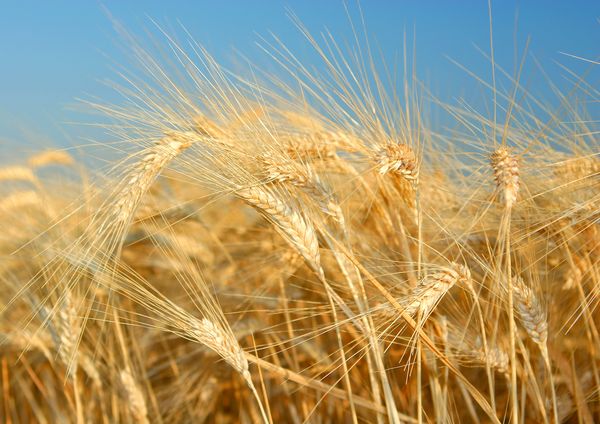THIS is a question asked and handed to us at our classes or even in our meetings more than a thousand times out of three hundred and sixty-five days. Again and again it is answered, and those who have advanced a little beyond it in the Mazdaznan studies oftentimes forget that there was a time when they asked the very same question and now wonder at our patience in answering the same many times over during the day. We love to answer the question, and every one who has caught the Mazdaznan spirit will do the same.
Of course, when once we understand the simplicity of nature in itself and have grasped the economy of life, we do wonder how it was ever possible to ask, “What can we eat?” We can eat many things, but the question really is, “what shall we eat to remain in direct harmony with nature and nature’s law?”
If we but consider the little wear and tear in our bodily constitution, and understand intelligently the process of perpetuation of one’s own kind, viz., the organic action tending towards the accumulation of life forces peculiar to its sustenance by perfect activity only and that food itself does not directly supply strength and vitality to the system, nor does the building of the body proper depend upon it, then will it dawn upon our heretofore deluded mind as to the simplicity in living towards the accumulation of life forces peculiar to its sustenance by perfect activity only and that food itself does not directly supply strength and vitality to the system, nor does the building of the body proper depend upon it, then will it dawn upon our heretofore deluded mind as to the simplicity in living.
It will depend largely upon our desires to put the will, correspondingly responsive in our mind to our intentions of simplicity in living. If we can do so, then we shall at once learn to appreciate our Father’s own command: “Every herb bearing seed, which is upon the face of all the earth, and every tree, in which there is the fruit of a tree yielding seed, shall be meat for you,” while, “to every beast of the earth, and to every fowl of the air, and to everything that creepeth upon the earth, wherein there is life, I have given every green herb for meat.” Gen-Isis, I. 29-30.
What does this mean, is the question that will suggest itself repeatedly? It means, that the grain, in itself an herb and a seed-herb which contains within the seed the fruit, is the principal food for man to subsist upon. Such necessarily ripens upon the face of the earth, above the ground; while of the trees such growths, which are not the result of merely one season, but bear for years to come, only those are of value which have grown up from the seed directly and not from cuttings, slips, etc.
Of the seed bearing herbs, of which the grains wheat, rye, barley, corn and oats are considered the staff of life, the wheat is the principal one and the most highly developed, containing elements in correct proportions for the perpetuation of cell formation, whatever may be the bodily condition it may meet. All other grains have to be measured in accordance to the standard of wheat, which is the basis of measuring all grains as to their chemical values as foods. Barley or rye alone will not nor can they equalize the conditions of requirements in the organization of soil substances, for the reason that they are deficient in one certain chemical compound, while too rich in another. It is for that reason that the other grains are to be used for a change but only during certain seasons or parts of seasons. Corn used in season as a green fruit is quite advisable, while as a food when ripe it is to be used sparingly or in combination with other grains. Barley is especially of value towards spring time, as is rye towards winter time, while oats occasionally answer good service in colder climes. Corn is better in the fall of year, while wheat is valuable and takes the place of all grains all the year round as to their chemical values as foods. Barley or rye alone will not nor can they equalize the conditions of requirements in the organization of soil substances, for the reason that they are deficient in one certain chemical compound, while too rich in another. It is for that reason that the other grains are to be used for a change but only during certain seasons or parts of seasons. Corn used in season as a green fruit is quite advisable, while as a food when ripe it is to be used sparingly or in combination with other grains. Barley is especially of value towards spring time, as is rye towards winter time, while oats occasionally answer good service in colder climes. Corn is better in the fall of year, while wheat is valuable and takes the place of all grains all the year round.
Of the fruits, the trees bearing seeds are of secondary value and are to be used principally as eliminators, tonics, or appetizers, such as apples, cherries, peaches, oranges, plums, etc., while raspberries, strawberries, blackberries make better juices or liquids for drinks. Nuts of all descriptions furnish fuel for muscular action by virtue of their oils, of which the almond is the best, then filberts, hickory nuts, pine nuts, walnuts, Brazilians. Peanuts are a vegetable product requiring roasting, boiling; treating and for that reason, besides developing below the ground are not food for man, although they are fattening which is good for the animal nature of beasts and beings of the lower types where they prove of value in relieving the depressive conditions of a constipated and diarrhetic nature. In man they incite the moral functions to animal action, to which the potato may be added as keeping the brain action of man inclined to superstitious tendencies.
“What shall we eat,” will only become plain to him who begins to realize that the wants of the being as to sustenance and perpetuation are but little. A dish of wheat, about two ounces in weight or three tablespoonfuls of it at a time, will suffice for an ordinary meal. Such wheat may be used raw, or soaked for a few hours in just enough water to be wholly absorbed by the wheat, or it may be steamed for one minute after soaking. Again it may after soaking be boiled for four or more hours until it swells to three and more times its original size. Masticated thoroughly and slowly, well mixed with saliva, two ounces of this wheat will satisfy the ordinary being at one meal, which meal may be taken twice a day. Then eat a few blanched almonds, which means almonds with skins taken off, which is easily accomplished by pouring hot water on them. Although even this is not absolutely necessary as the skin may be scraped off readily, which is to be done with every kind of nuts we use. Six to ten almonds will suffice at a meal. To finish the meal, fruit may be used but where fruit is out of season eat some vegetable first before the wheat.sustenance and perpetuation are but little. A dish of wheat, about two ounces in weight or three tablespoonfuls of it at a time, will suffice for an ordinary meal. Such wheat may be used raw, or soaked for a few hours in just enough water to be wholly absorbed by the wheat, or it may be steamed for one minute after soaking. Again it may after soaking be boiled for four or more hours until it swells to three and more times its original size. Masticated thoroughly and slowly, well mixed with saliva, two ounces of this wheat will satisfy the ordinary being at one meal, which meal may be taken twice a day. Then eat a few blanched almonds, which means almonds with skins taken off, which is easily accomplished by pouring hot water on them. Although even this is not absolutely necessary as the skin may be scraped off readily, which is to be done with every kind of nuts we use. Six to ten almonds will suffice at a meal. To finish the meal, fruit may be used but where fruit is out of season eat some vegetable first before the wheat.
The method of eating is so simple that it requires no other study than simplicity in preparation and natural hunger for an appetizer, always bearing in mind to eat slowly and when hunger is half satisfied to quit eating but milk the tongue instead to aid digestion. When we eat we are to do so with thanksgiving in our hearts and thoughts directed towards vibrations of love for all things, bearing in mind that food is not the principal factor in the sustenance of our strength and health, but merely a perpetuator of the soil conditions of our constructive manifestation upon which the nature of food as well as how taken leaves its impress behind, determining the conditions for the future.
From Mazdaznan Magazine 1902 Nov. p.20.
Photo credits: © Philippe LERIDON - stock.adobe.com














